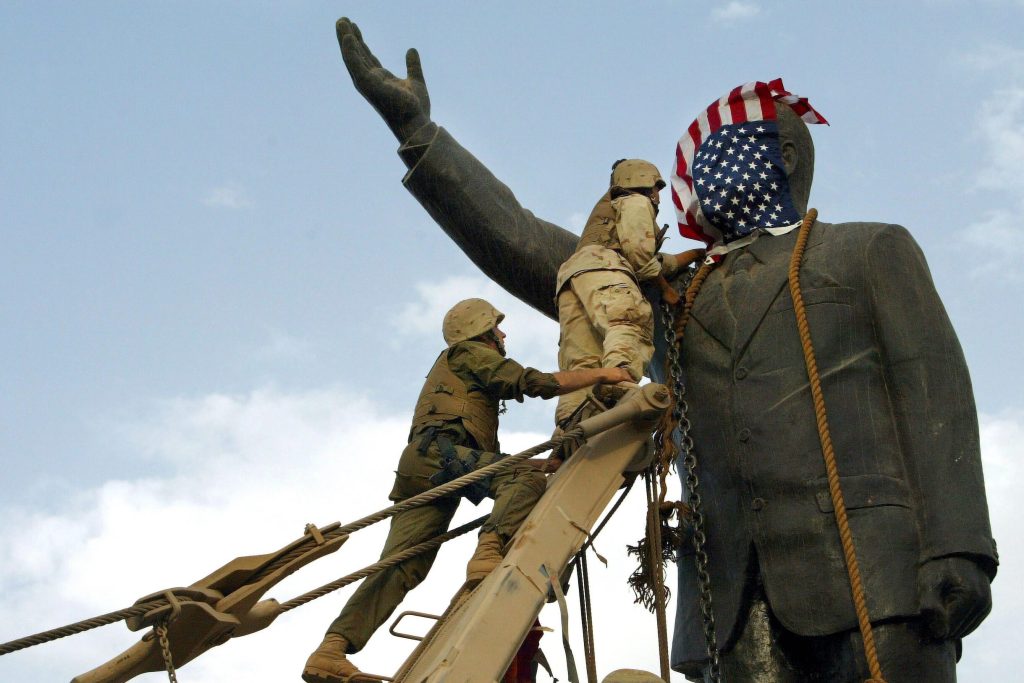“Right from the beginning.” That is one of The American Conservative’s taglines, and this week, two decades following the U.S. invasion of Iraq, it rings especially true. We were right from the beginning. But my use of “we” here is a strange one; I am too young to have had a meaningful opinion of the war at the time. The Iraq War, the Global War on Terror, Afghanistan, all those were given to me by the adults, like the rest of the country, or being an American, or our whole history, was given to me—something between a gift and the feeling of having been thrown. From my perspective, there was just one thing epic about the Iraq conflict: that I became aware of it in medias res. My earliest really clear memory of this history was seeing the preambulatory footage of Saddam Hussein’s execution by hanging, on TV in a private box at a Portland Trail Blazers basketball game. My bragging rights are borrowed.
What lessons should I borrow, too? As a latter-day millennial, I have read our Iraq anniversary series this week with the interest of looking through a family photo album, hoping for a clearer picture of my past. Get out, end it, don’t do it again; all that I know, grew up knowing (Ron Paul 2008, another early political memory that is definitely my own). But how?
If this series of reflections offers memories made sober by time, it perhaps does not offer a plan. In Andrew Bacevich’s memorandum, the Iraq invasion was an exercise in American hegemony, seeking to solidify something that had been put to question; the winner, in the end, in our increasingly bipolar world, was China, stepping into the very vacuum we sought to prevent. In Peter Van Buren’s contribution, I am reminded that the civil servants and managers of our policies on the ground are only human. From the political theorist Joshua Mitchell’s essay, we receive a warning that an egalitarian and democratic America at war with its own past and the idea of national sovereignty has forgotten the aristocratic virtues that still rule a world of nations. All that on Monday.
Subscribe Today
Get weekly emails in your inbox
There is Tuesday, too. From Paul Gottfried, eminent historian of the right, we get a case study in changing one’s mind as knowledge replaces opinion, and the realization that the assertion of American power can be questioned for right-wing reasons. Sohrab Ahmari reminds readers that George W. Bush and his officials have not paid a price for the destruction of Iraq—a haven for ancient Christian communities left a wrecked client of Iran. James Bovard writes of how the lies and failures of our desert misadventure strengthened the wall of secrecy between government and the governed, breaking the bond of trust between the people and their leaders. There are more reflections up today, to be followed by more this week.
A theme does emerge in all this, a simple observation about the nature of foreign policy, or really about policy in general. In a democracy, every action on the world stage tells us something about ourselves even as it seeks to shape reality by influencing the behavior of other actors. And sometimes the story we want to tell about our national character is at odds with the actions that we take, or perhaps the dissonance goes the other way. The implication, if not corollary, of Ronald Reagan’s “Evil Empire” was always that we were a good empire; we were inheritors—by British cooperation, and right of conquest, and in ’89 by simple survival—of global sea power, Athens ascendant. Iraq should be a Melian reminder that might does not make right, that while the first Iraq war had limited, definite ends, a clear objective from which victory could be declared, the second was an exercise in forgetting that to be the good empire you have to be a good empire first: good at governing other peoples, at understanding them and their interests and how they relate to your own.
But America is a republic, you say. That may be the chief lesson learned by my generation and younger Americans from a foolish invasion of Iraq, that there remains a rupture between who we tell ourselves we are and our role in world affairs. The morals of international cooperation and the morals of putting Americans first are different morals. The interests of citizens as citizens, the liberty and virtue required for self-government, stand in tension with the interests of citizens as consumers, beneficiaries of global primacy and runaway debt. In our wealth and geographic security, in a brief window of time when we were the sole superpower, twenty years ago the U.S. could afford to risk hubris. And in some ways, today, our imperium has never been stronger—the pride flag flies around the world, BLM has joined Coca-Cola and the Golden Arches, NATO has been refreshed. But here at home, managed decline and the rule of mobs and geriatrics cannot be ignored. Rome was a republic, too.









